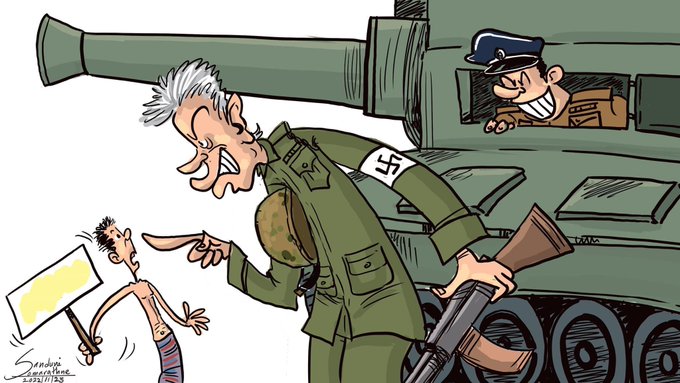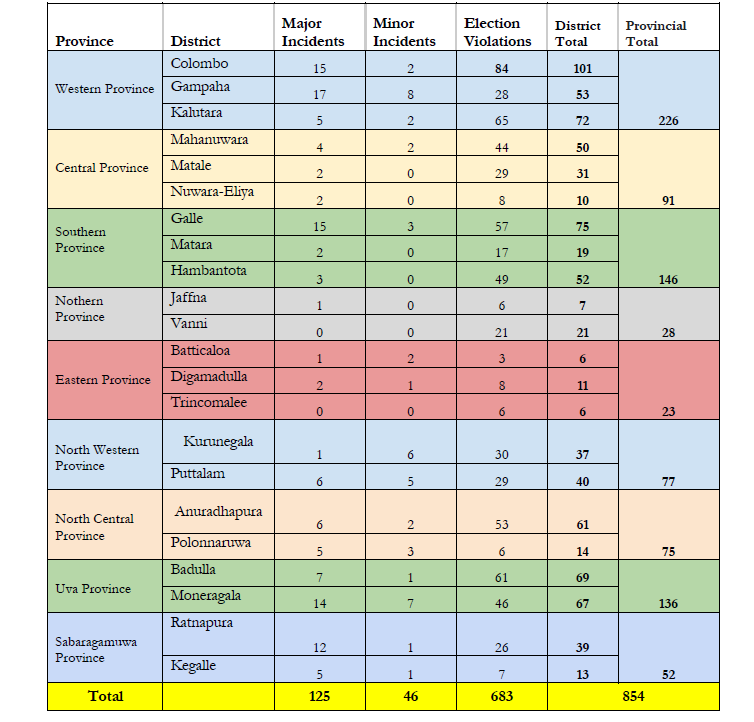Presidential Election 2024:
Summative Report on the Campaign Period (15 Aug – 18 Sep 2024)
Quantitative Overview of Election Violations:
At the end of the campaign period CMEV notes with concern that what began as a peaceful public election campaign has escalated into a relatively contentious and potentially troubling situation during the last ten days, moving from 09 incidents recorded per day on 02 September to 96 recorded on 15 September, as can be seen from the following graphs.
The fact that the first election-related murder was recorded on 17 Sep 2024, with another possible murder still being verified by CMEV, is cause for concern. It also points to possible escalation of violence on election day and in the immediate post-election period. Other major incidents recorded during last two weeks include arson (10), especially of party offices of the NPP/JVP, assault (22), threat and intimidation (14), all of which are dwarfed by serious abuse of state resources and state power (64).
It is useful to compare the number of complaints received by the Election Commission with those received by CMEV, as of 17 September 2024.
Source Complaints of Violence
The above Table shows that while the Election Commission has received a much larger number of complaints, either due to their system of classification or other reasons, the number of serious violations and violence is significantly lower than CMEV reports.
In terms of the geographical disaggregation of these incidents, the Colombo (101) and Kalutara (72) districts in the Western Province, the Galle District (75) in the Southern Province, the Anuradhapura District (61) in the North Central Province, and the Badulla (69) and Moneragala (67) districts in the Uva Province accounted for significant violations.
It is also notable that of the total number of violations reported directly to CMEV, 125 or 14.6% are classified as major incidents, which is higher than in previous elections. However, violations of election laws account for 80% of all incidents reported, which indicates that the extent to which this election is keenly contested, with multiple parties and candidates being involved. At the electoral division level, CMEV has identifed Moneragala, Ratnapura, Panadura, Puttalam, Tissamaharama, Anuradhapura East, Homagama and Maharagama, among others, as potentially volatile electorates because the number and severity of pre-election violations is highest in these electorates.
Core Election-Related Concerns:
While the election campaign period is still relatively peaceful, despite a worrying trend of increasing confrontation among the supporters of candidates, some crucial factors are potentially able to affect the legitimacy of the entire election. Among these are the following:
1. Presidential Abuse of State Power
The most troubling issue that has negatively affected the conduct of a free and fair election is the widespread and systematic abuse of state power and resources by the President in support of his own candidacy in this election. CMEV has made formal complaints to the Election Commission regarding the serious violation, by candidate Mr. Ranil Wickremasinghe, of Sections 78 (Undue Influence) and 79 (Bribery) of the Presidential Election Act No 15 of 1981, as well as of core clauses of the Code of Conduct for candidates. These complaints include the decision to raise state emplyees’ salaries with effect from 2025 publicised on the eve of the postal voting period, introducing tax reduction
regulations and removing restrictions on vehicle imports, as well as sacking deputy ministers who did not support his presidential campaign. The abuse of power by provincial Governors is a serious concern, as they operate directly under the President, and have even wider powers in the absence of elected provincial or local government representative.
The Election Commision has on numerous occasions attempted to prevent such blatant abuse, but it appears to have succeeded only in a limited number of less serious instances than those cited above. In summary, is clear that President Wickremasinghe has chosen to defy both the Supreme Court and the Election Commission of Sri Lanka in his quest to support his own candidacy in the presidential election by any means possible, including through using the Cabinet, the Presidential Secretariat and all ministries under his purview. [See Annexure 1 for details]
2. Potential Concerns to Vulnerable Populations and Exposed Areas:
The ability of citizens to exercise their voting rights in an unfettered manner in the Northern and Eastern Province remains a cause for concern, and it appears that the very discourse and structure of this election campaign has marginalized many of them to the point of being disengaged from the entire process thus far. In this sense, the absence of any incidents in the North, for instance, is more a reflection of the disillusioned perception of the irrelevance of this election, seen by many as a “southern” issue, than due to any other reason.
There are also serious concerns raised by the Malaihar Tamil advocacy groups about bringing in the plantation companies in to the voting process through, for instance, making the estate authorities responsible for issuing temporary voter identity cards. Other minority and marginalized groups have also expressed their worries about the mainly majoritarian focus of this election campaign.
3. Compliance with the Campaign Finance Act:
CMEV has actively monitored election campaign expenditure patterns during the 2024 Presidential Election. In addition to contributing data to a collective campaign finance monitoring tool led by Transparency International Sri Lanka (TISL), CMEV has focused on identifying illegal spending by presidential candidates, their political parties, alliances, and supporters. Despite the enactment of the Regulation of Election Expenditure Act, No. 3 of 2023, CMEV, as part of its campaign finance monitoring effort, has identified several challenges in its enforcement. The limited authority of the Election Commission of Sri Lanka (ECSL) to initiate investigations and prosecutions under this law hampers its
effectiveness.
The ECSL currently lacks the ability to independently investigate financial disclosures or election-related spending by candidates and their parties. The absence of specific spending caps in key expenditure categories creates imbalances in political influence, with only a general ceiling for overall expenditure provided by the law. Moreover, unequal TV coverage in news broadcasts and other prime time programs provides some candidates with unpaid
advertisements and hence an advantage over their rivals, as is demonstrated in CMEV’s analysis in Annexure 2 below.
CMEV stresses the need for enhanced investigative and prosecutorial powers for the ECSL to ensure compliance with electoral laws, thus fostering a fairer electoral process. Strengthening ECSL’s authority to monitor and audit campaign finance reports is vital to realizing the intended objectives of the Regulation of Election Expenditure Act. A key concern noted by CMEV is the inability to calculate or account for the costs related to the misuse of state resources as part of election campaign expenditure, despite these costs being ultimately borne by voters. CMEV will continue its observations, particularly regarding alleged illegal expenses, and will cross-reference its findings with the expenditure
and contribution reports submitted by candidates, which are due 21 days after the election results are released.
4. Social Media Monitoring:
CMEV has examined over 8000 social media posts from key actor accounts covering the period 27 August to 17 September 2024 in Sinhala, Tamil, and English. Content about the ongoing campaign and electoral processes has largely concerned candidate platforms and events, electoral preparations, and calls to vote democratically. Policy-related discussion has largely focused on the ongoing economic and debt crisis. In general, these posts have been positive in tone in relation to the election, with about 8% of the relevant 6406 posts flagged as being about ongoing activities, or that include content that could undermine the integrity of the electoral process. In terms of the public assessment of information accuracy, less than 2% of posts were flagged by monitors as likely misinformation, disinformation, malinformation, or fake news.
A key element of social media in today’s context is targeted offensive speech, often referred to as hate speech. CMEV’s analysis preliminarily identified 153 incidents of potentially offensive speech, which is a relatively small number, but some of them have had a widespread impact due to repeated coverage at a national level. Among these are targeting persons based on ethnicity, religion, nationality, social class, and identity. A more detailed analysis of social media posts will be included in CMEV’s Final Report.


